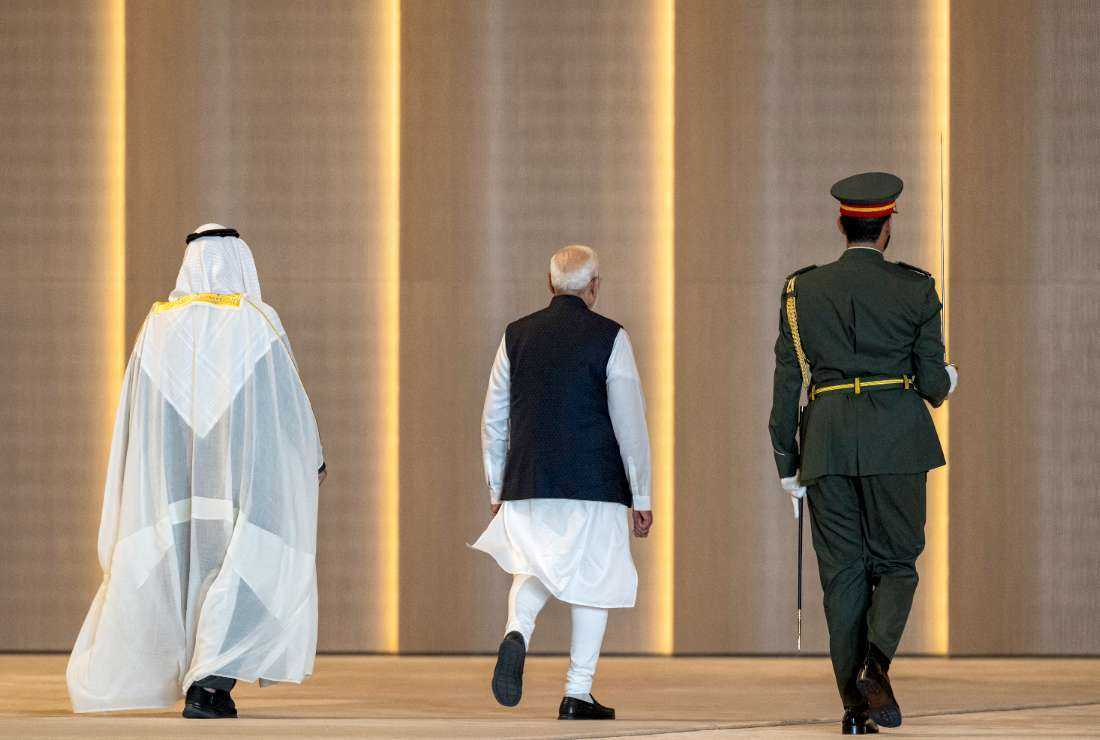
Indian Prime Minister Narendra Modi (center) with UAE President Sheikh Mohamed bin Zayed al-Nahyan (left) inspecting a guard honor during a reception in Abu Dhabi on Feb.
The Feb. 15 judgment by a five-judge Constitution bench headed by Supreme Court Chief Justice D. Y. Chandrachud said financial contributions to political parties “may be a way of quid pro quo.”
“Political contributions give a seat at the table to the contributor… this access also translates into influence over policy-making,” Chandrachud reportedly said.
The electoral bonds scheme was introduced in 2018 by Prime Minister Narendra Modi’s government.
These bonds are monetary instruments that a citizen or corporate body can buy from the government-controlled State Bank of India (SBI) and then hand over to a political party, which is free to redeem them.
The bonds are anonymous and without any limits. Neither the purchaser of the bond nor the political party is required to declare the transaction.
The Supreme Court bench also directed the SBI to not issue any more electoral bonds and furnish identity details of those who bought them and the political parties who received and redeemed them.
Father Cedric Prakash, a human rights activist based in Modi’s Gujarat state, lauded the top court order, saying, “The SC [Supreme Court] has done the right thing.”
“It can certainly put an end to pumping in black money into electioneering,” the Jesuit priest told UCA News.
“The verdict is a historic moment for the march of democracy in India,” said Father Babu Joseph, a former spokesperson of the Catholic Bishops’ Conference of India.
The Divine Word priest based in New Delhi told UCA News that the verdict has sent “the right signals” to the public.
The scheme was criticized by the Reserve Bank of India, the top bank in the country before it was introduced. The Election Commission of India described the system as a “retrograde step.”
Since 2018, secret donors have given more than US$1.9 billion to political parties through electoral bonds. Between 2018 and March 2022, about $600 million went to the BJP.
Critics have accused the ruling party of having quid pro quo deals with the donors whose details are with the SBI.
Since the SBI is owned by the government, the ruling party has access to its data. This is likely to dissuade large donors from siding with opposition parties, they said.
“This ill-conceived and partisan scheme had created an unprecedented situation where the ruling party had a clear edge over others,” Father Joseph said.
“There is no iota of doubt that the electoral bond scheme was a complete fraud on the people of the country,” Father Prakash said.
He said if it was not a fraud the government and the donors would not have refused to reveal the names of donors and beneficiaries.
In its order, the Supreme Court has directed the bank to share information on electoral bonds with the Election Commission and has asked the poll body to publish the details of secret political donors on its website on or before March 13, 2024.
Father Prakash called the electoral bonds “blood money” and asked the top court to pass an order to recover the money raised through them from the political parties
The petitioners in the case include the Association for Democratic Reforms, a non-governmental organization, the Communist Party of India (Marxist), and an opposition Congress leader.
Modi’s Bharatiya Janata Party is seeking a third consecutive term in office at the next general elections scheduled in April-May this year.
